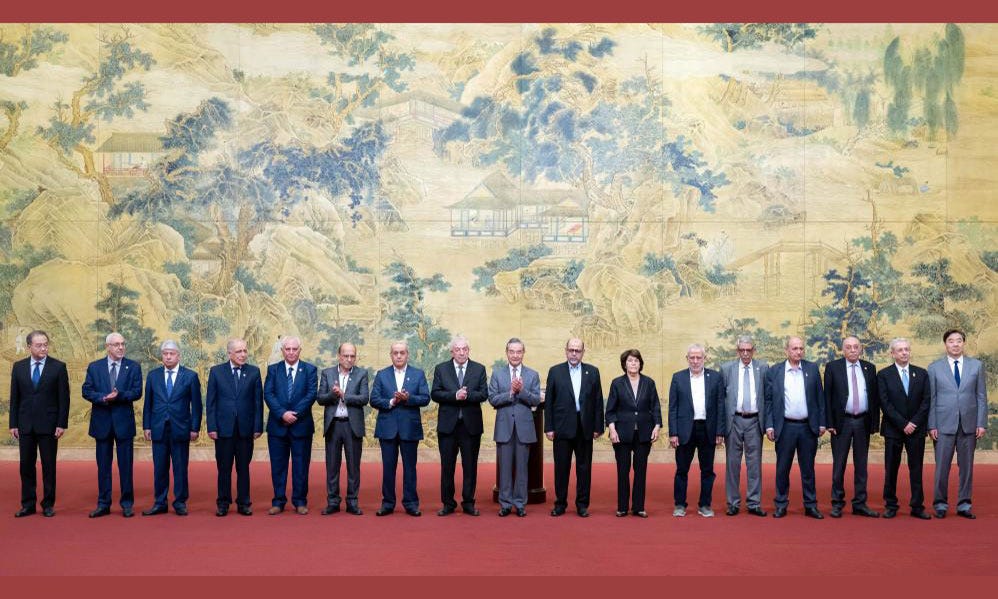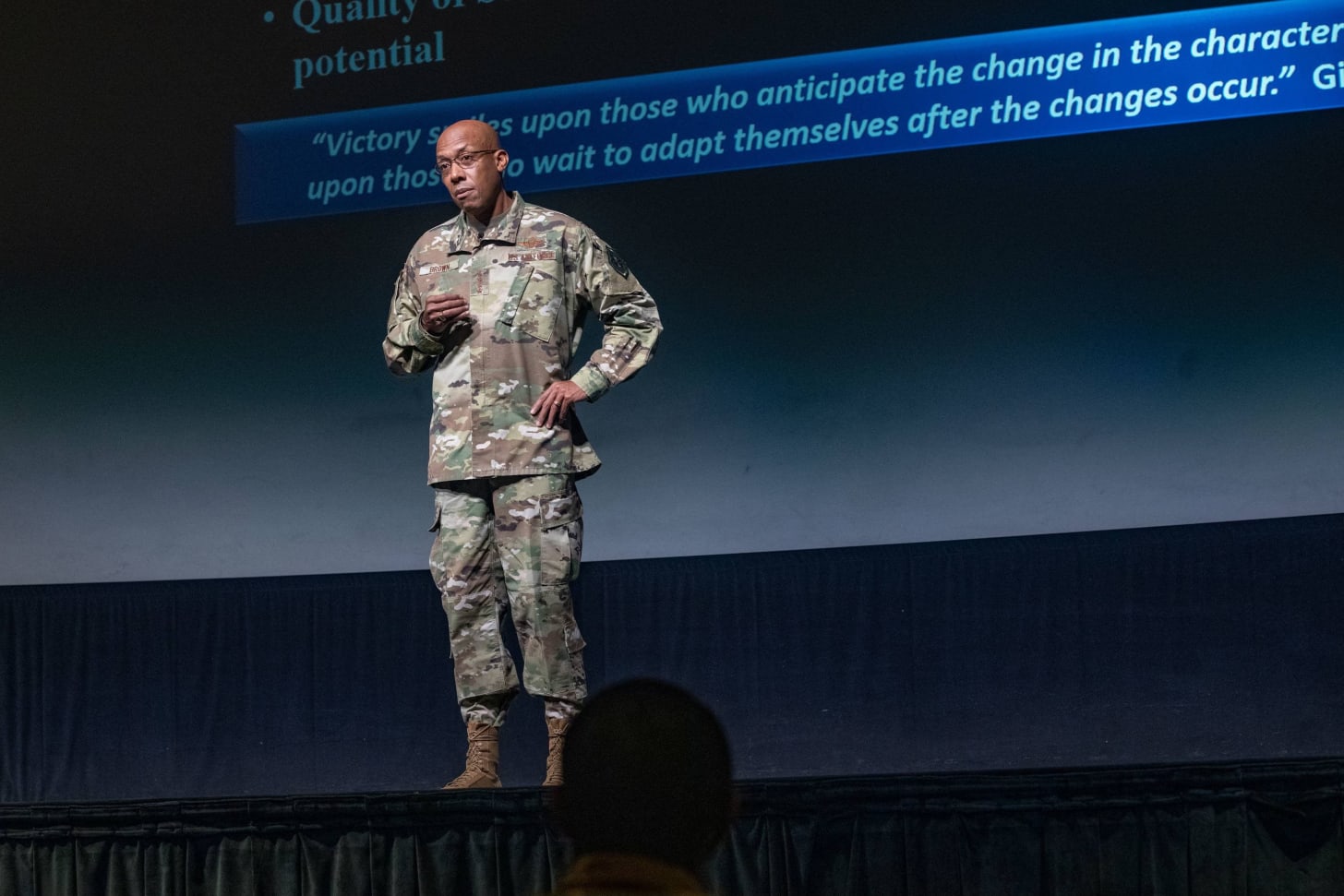Mediation versus Militarisation
Peace building in Beijing, Warmongering in London and Washington

China's image as 'peace builder' is highlighted again
By Global Times
On Tuesday, Beijing became the focal point of global diplomacy. Representatives of 14 Palestinian factions signed the Beijing Declaration on Ending Division and Strengthening Palestinian National Unity, historically announcing the end of division and the strengthening of Palestinian unity. On the same day, Ukrainian Foreign Minister Dmytro Kuleba began his visit to China, marking the first visit by a Ukrainian foreign minister since the outbreak of the Russia-Ukraine conflict. Parties from two of the world's most significant conflict regions simultaneously seek political solutions in China, forming a "diplomatic resonance." One netizen commented, "The world is in tatters, and China is stitching it back together." While these words may not be entirely accurate, they vividly reflect China's efforts to fulfill the Global Security Initiative and address the deficit in global peace.
The Israel-Palestine conflict and internal Palestinian divisions involve extremely complex backgrounds and interests, making the reconciliation process long and tortuous. The gathering of 14 Palestinian factions in Beijing for reconciliation talks has been met with cautious optimism by mainstream international media. The announcement of the Beijing Declaration immediately shocked international public opinion. Mustafa Barghouti, secretary-general of the Palestinian National Initiative, stated that the Beijing Declaration goes "much further" than any other reached in recent years. The scene of representatives from 14 factions signing the declaration marks an important historical moment in the Palestinian liberation movement and brings valuable hope to the long-suffering Palestinian people.
The Beijing Declaration is a crucial step toward resolving the Palestinian issue and achieving peace and stability in the Middle East. It is also the first time that an internal Palestinian reconciliation document has been organized by a country outside the Arab world. When asked why this conflict can only be resolved in Beijing rather than elsewhere in the world, Mustafa Barghouti said it is because China is "very decent and honest." The sincere efforts made by China to support the rights of the Palestinian people, end division and unify the Palestinian stance have been highly praised by all factions in the Beijing Declaration, which is well-deserved.
The Beijing Declaration also holds transcendent significance. From achieving historical reconciliation last year between Iran and Saudi Arabia to today's Beijing Declaration, the world has witnessed a broader range of possibilities and gained immense confidence. The new security path advocated by China - dialogue rather than confrontation, partnership instead of alliance, and win-win cooperation instead of zero-sum games - has proven to be viable. A world characterized by lasting peace, universal security, common prosperity, openness, inclusiveness, and ecological beauty is attainable. Unraveling knots does not require the sword. Beyond isolation, pressure, sanctions, confrontation, interference, aggression, and mutual destruction, humanity has another path: resolving complex and difficult issues through dialogue and cooperation. Humanity does not have to repeat the mistakes of the past and is not bound to the historical cycles of war and peace, prosperity and decline, order and chaos. The Global Security Initiative advocated by China is a beacon of hope.
The progress in Palestinian internal reconciliation also provides insights into the ultimate resolution of another conflict. Besides discussing China-Ukraine bilateral relations, a key focus of Kuleba's visit to China is seeking ways to end the Ukrainian crisis in discussions with China. Before his trip, Kuleba recorded a video for Chinese netizens, expressing his hope for "real and just peace" and for Ukraine to "restore stable development and prosperity, and security for the people." Promoting a peaceful resolution to the Ukrainian crisis is a consistent stance of China, which has also made significant efforts toward this goal. The door to peace remains open, and for the international community, it is crucial to work toward encouraging peace talks rather than the opposite.
Peace cannot be achieved overnight, and China is aware of the difficulties along the way. However, as long as it benefits the world and its people, China feels an unshirkable responsibility. Currently, the parties involved in the world's two major regional conflicts are in China, both seeking goals related to "peace." This is not coincidental. China's impartial stance, free from selfish motives or interests, has garnered increasing trust from the international community. As a value system and methodology that China offers for global peace, the Global Security Initiative transcends geopolitical and ideological differences, and is the greatest common denominator for all parties seeking peace and reconciliation. Each successful practice of the GSI attracts more like-minded partners and continually validates the ancient Chinese saying: "Virtue is not left to stand alone, and he who practices it will have neighbours."
Read more here.
U.S. would defeat China in a war over Taiwan
Brown says military ready to respond to any takeover attempt by Beijing
By Bill Gertz (Washington Times)
The U.S. fields the most powerful army in the world and would defeat China if war breaks out over Taiwan, according to the chairman of the Joint Chiefs of Staff. Air Force Gen. Charles Q. Brown, who became the president’s most senior military adviser on Oct. 1 2023, said a conflict with China is neither imminent nor inevitable, but that the U.S. military must be ready if war breaks out.
Asked if the United States could defeat China in a conflict, Gen. Brown said: “Yes, I’m fully confident in our force.”
“We are the most lethal, most respected combat force in the world,” he told the Aspen Security Forum on Friday. “Now, it’s going to take all the nation if we go to conflict with the with the PRC, and I’m confident, if we’re challenged, we will be there.”
A recent think tank simulation studying conflict between U.S. and China forces over Taiwan found the United States defeats China in combat but at a heavy cost. The Center for Strategic and International Studies exercise projected that U.S. and allied forces lose tens of thousands of troops, dozens of ships and hundreds of aircraft in the war.
Gen. Brown was asked about a Japanese government report analyzing stepped-up Chinese military drills around Taiwan that concluded Beijing’s forces could land forces on Taiwan in a rapid assault within a week of imposing a blockade. The report also stated that the People’s Liberation Army would conduct an operation to seize control of the self-ruled island before U.S. and allied military forces could come to Taipei’s aid.
Gen. Brown said he agrees that the current state of warfare has changed with advanced technology. A war with China, he said, will not be similar to any conflicts of the past 30 years or more.
“These will be major conflicts akin to what we saw in WWII, and so we’ve got to come to grips with that,” he said. “Two, the PRC knows where our advantages are and the combat capability we can bring to bear. My sense is they’ll want to go quick so they can do it before we can bring capability there.”
To be ready for that scenario, Gen. Brown said he is accelerating previous efforts to build up American military logistics in the region, stockpiling weapons, ammunition, supplies and other military support before a conflict breaks out.
“The more we can show that we can get there fast, [the] greater [the] deterrence,” he said.
President Biden has said the United States would intervene militarily if China were to use its military to attempt to take over Taiwan.
Beijing has vowed to take control of the island that it claims as its territory.
Asked about military analysts who said Taiwan should focus on purchasing more effective and strategic defense weapons from the United States and former President Donald Trump’s comment that he wants Taipei to spend more on defense, Gen. Brownsaid the Pentagon is already engaged with Taiwanese officials on those topics.
The use of drone weapons and cyberwarfare capabilities are key indicators that the character of warfare is evolving, he said. That means that “high-end” military capabilities may not be the decisive factor in war. Instead, a greater mix of both traditional military force and asymmetric warfare capabilities is needed.
Restructuring Taiwan’s military defenses will “make them a much tougher target, and much more challenging” for the Chinese military in attempting an assault, the four-star chairman said. U.S. and allied military forces are working to improve their skills so that American adversaries “never want to mess with us,” the general said.
“I mean, I play to win, and I’m going to do everything I can to make sure it’s an unfair fight. That’s my focus, and so we’ve got to stay nimble on this kind of look long.”
The recent computer software glitch that shut down networks around the world probably was watched by U.S. adversaries who could cause similar disruptions in a future conflict, Gen. Brown said.
“I’m sure our adversaries are looking at this as a way to … put sand into gears if we’re trying to generate combat power to go to respond for a crisis anywhere around the world,” he said.
Read more here.
Britain has three years to prepare for war
The top-ranking General also warned Britain's enemies could 'detonate' each other
By Jerome Starkey, Defence Editor
THE new Army chief warned Britain has three years to prepare for war. General Sir Roly Walker said there was “just enough time” to tool up to deter enemies such as Russia.
The new Army boss said the UK must accept it is a 'medium-sized' fighting force. The ex-SAS boss said: “We have just enough time to prepare."
He insisted war was not inevitable but warned that Britain’s enemies were “increasingly aligned”.
In his first speech as Chief of the General Staff, he said: “We must restore credible hard power to underwrite deterrence.”
The former Irish Guards officer has inherited the smallest Army for more than 300 years – with just 72,500 trained troops.
He vowed to triple its fighting power – with better weapons but no extra troops – so that, “any British land force will be able to destroy a force at least three times its size”.
Gen Walker said commanders had struggled to come to terms with the fact they were no longer a “big army”.
And he warned threats from Russia, China and Iran would converge in 2027 and could "detonate" each other.
Speaking on the sidelines of the Rusi Land Warfare Conference he said Russia would "come roaring back to get their vengeance" against the West.
He said Iran was on track to get a nuclear bomb and China wanted the option to invade Taiwan by that date.
The former Director of Special Forces said: “We have struggled to shake a big army mindset where some still believe that raw troop numbers alone determine fighting power.
“That is out of date.
“We are, in fact, a medium-sized army and we should embrace this.”
Under his plan, a British brigade of some 7,000 soldiers would be able to beat a Russian force like its 18th Combined Arms Army of 20,000 troops.
He claimed they would be able to do it with more accurate and powerful weapons.
He said: "We will sense twice as far, decide in half the time, and deliver effects over double the distance with half as many munitions.
"Our Ukrainian partners are beginning to do this with great results now, marrying cheap and expendable sensors and effectors to smart software that is coming from British coders."
It came as his boss, the Chief of Defence Staff, warned “we are not as strong as we could be”.
Admiral Sir Tony Radakin said “historic underinvestment” had taken its toll on the Army's weapons, training, people and technology.
Defence chiefs fear Russia will rebuild its forces within the next five years, after massive losses in Ukraine.
Defence Secretary John Healey warned Putin "won't stop in Ukraine" if he wins.
And China’s President Xi has ordered his forces to be ready to take Taiwan by 2027 – raising fears in Europe that America will refocus its forces in the Pacific.
Labour have vowed to increase the defence spending to 2.5 per cent of GDP, but Sir Keir Starmer refused to say when.
Read more here.




